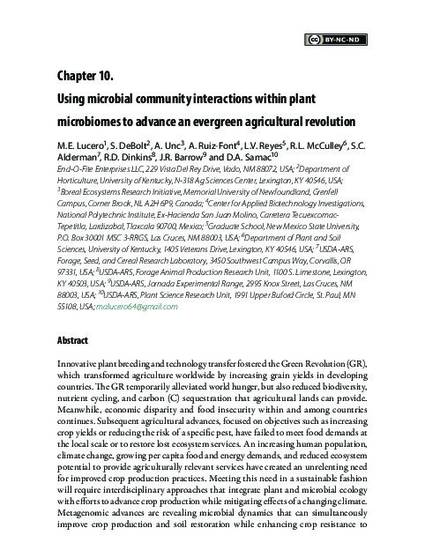
Innovative plant breeding and technology transfer fostered the Green Revolution (GR), which transformed agriculture worldwide by increasing grain yields in developing countries. The GR temporarily alleviated world hunger, but also reduced biodiversity, nutrient cycling, and carbon (C) sequestration that agricultural lands can provide. Meanwhile, economic disparity and food insecurity within and among countries continues. Subsequent agricultural advances, focused on objectives such as increasing crop yields or reducing the risk of a specific pest, have failed to meet food demands at the local scale or to restore lost ecosystem services. An increasing human population, climate change, growing per capita food and energy demands, and reduced ecosystem potential to provide agriculturally relevant services have created an unrelenting need for improved crop production practices. Meeting this need in a sustainable fashion will require interdisciplinary approaches that integrate plant and microbial ecology with efforts to advance crop production while mitigating effects of a changing climate. Metagenomic advances are revealing microbial dynamics that can simultaneously improve crop production and soil restoration while enhancing crop resistance to environmental change. Restoring microbial diversity to contemporary agroecosystems could establish ecosystem services while reducing production costs for agricultural producers. Our framework for examining plant-microbial interactions at multiple scales, modeling outcomes to broadly explore potential impacts, and interacting with extension and training networks to transfer microbial based agricultural technologies across socioeconomic scales, offers an integrated strategy for advancing agroecosystem sustainability while minimizing potential for the kind of negative ecological and socioeconomic feedbacks that have resulted from many widely adopted agricultural technologies.
Available at: http://works.bepress.com/rebecca_mcculley/27/

Published in Sustainable Agroecosystems in Climate Change Mitigation, Maren Oelbermann (Ed.), p. 183-202.
© Wageningen Academic Publishers 2014
This work is licensed under a Creative Commons Attribution-NonCommercial-NoDerivatives 4.0 International License.